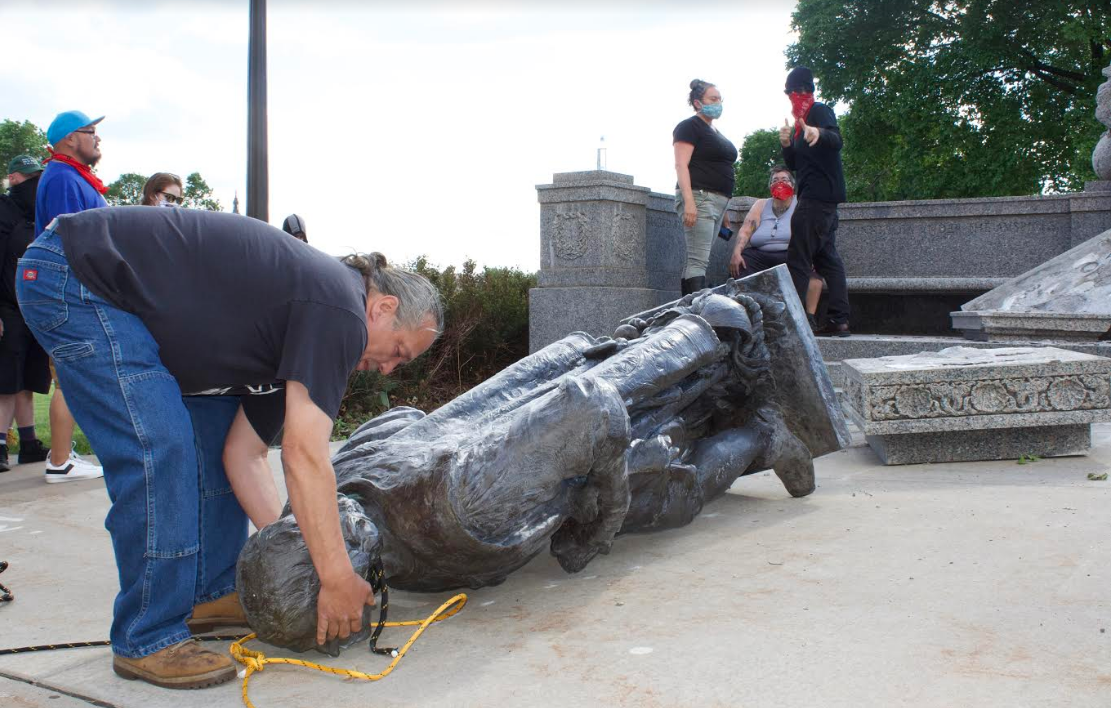
- Details
- By Darren Thompson
SAINT PAUL, Minn. — More than two months after the Christopher Columbus statue at the Minnesota State Capitol grounds was toppled, the Ramsey County Attorney’s Office charged one person in the incident on Thursday.
Mike Forcia, an enrolled tribal citizen of the Bad River Band of Lake Superior Chippewa (Wisconsin), was charged with criminal damage to property in the first degree, which is a felony crime in Minnesota.
“While charges against other participants remain a possibility, it was clear from the State’s investigation that Mr. Forcia was the primary organizer, leader, and executor of the incident. According to the state, the investigation led to a 13,000 page file on the event,” Ramsey County Attorney’s Office said in a statement.
On June 10, the day the Columbus statue was toppled, Forcia was seen cheering as the statue met pavement, but there is no footage of him pulling the statue down.
“Ramsey County District Attorney’s Office came up with charges today against my client,” Forica’s attorney, Jack Rice, told Native News Online. “It is something that is incredibly personal to Mike and something incredibly personal to me. Any felony charge is a serious charge and can gravely affect a person’s life.”
“This is a story that has affected Native people across the country for more than 500 years,” Rice added.
Rice is an enrolled tribal citizen of the Luiseño Tribe in California with more than two decades of experience practicing law. He’s a former Central Intelligence Agency Special Agent, former prosecutor and an internationally known journalist and television commentator.
At the scene of the toppling on June 10, a group of approximately 50 people pulled the statue down with no resistance from the Minnesota State Patrol while multiple sources streamed live on social media.
The toppling of the statue made national headlines and sparked cities across the United States to remove symbols of oppression and racism in public spaces, including statues of Columbus and Confederate monuments in cities such as Baltimore, Chicago, Richmond, Sacramento, Columbus and more.
“I wanted to help educate the ignorance and racism that has been predominant since the birth of the state of Minnesota,” said Forcia. “People don’t realize that systematic racism, slavery, white supremacy and genocide created America and having symbols representing that genocide is a continuous reminder of the atrocious history people continue to celebrate.”
As a result of COVID-19 precautions, court proceedings are severely limited and, according to Rice, Forcia may make his first appearance at court online at an unknown date.
Criminal damage to property in the first degree is a felony in Minnesota and punishable by up to 5 years in prison and/or fines reaching up to $10,000.
More Stories Like This
Native News Weekly (August 25, 2024): D.C. BriefsNavajo Nation Secures $285 Million in Federal Broadband Funding to Connect Thousands of Homes
Oral History Project Announces 18th Stop in Denver, Colorado: NABS Continues Preserving Critical Stories Across Indian Countr
Next on Native Bidaské: Protecting Legacy Before It’s Forgotten with the National Native American Hall of Fame
Zuni Youth Enrichment Project Wins $25,000 National Award to Strengthen Long-Term Support for Zuni Youth
Help us defend tribal sovereignty.
At Native News Online, our mission is rooted in telling the stories that strengthen sovereignty and uplift Indigenous voices — not just at year’s end, but every single day.
Because of your generosity last year, we were able to keep our reporters on the ground in tribal communities, at national gatherings and in the halls of Congress — covering the issues that matter most to Indian Country: sovereignty, culture, education, health and economic opportunity.
That support sustained us through a tough year in 2025. Now, as we look to the year ahead, we need your help right now to ensure warrior journalism remains strong — reporting that defends tribal sovereignty, amplifies Native truth, and holds power accountable.
 The stakes couldn't be higher. Your support keeps Native voices heard, Native stories told and Native sovereignty defended.
The stakes couldn't be higher. Your support keeps Native voices heard, Native stories told and Native sovereignty defended.
Stand with Warrior Journalism today.
Levi Rickert (Potawatomi), Editor & Publisher
